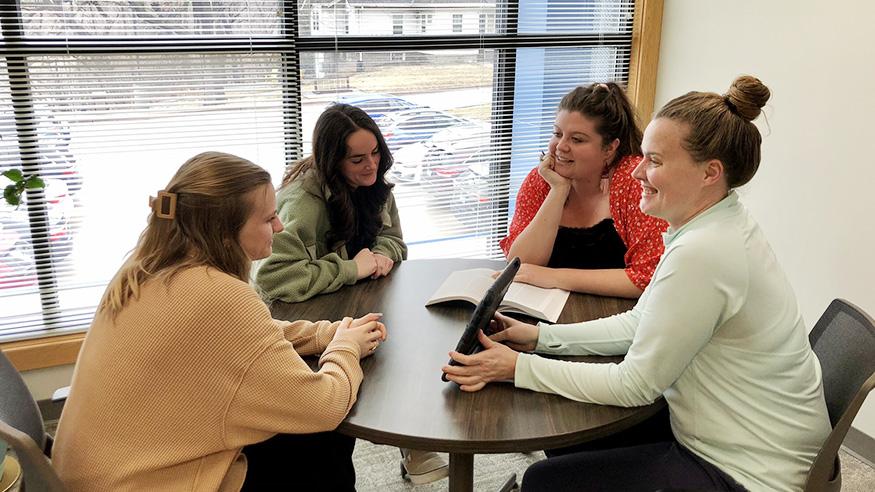
Augustana College communication sciences and disorders students work together with Barbara A. Roseman Center clinical supervisors to review plans for gender-affirming therapy sessions.
Augustana expands access to gender-affirming voice therapy
A $10,000 grant will allow Augustana College to increase access to gender-affirming voice therapy for transgender and gender non-conforming individuals.
Mary Lind, a 1972 communication sciences and disorders graduate, provided the grant that will expand access to low-cost individual and group gender-affirming communication therapy provided by Augustana’s Barbara A. Roseman Center for Speech, Language, and Hearing.
Laurel Williams, Roseman Center clinical supervisor and a communication sciences and disorders professor, said people often misconstrue this therapy as individuals simply seeking to modify the pitch of their voice.
“Gender-affirming therapy looks at all aspects of communication: voice, resonance, articulation, expressive language, body language,” she said. “It helps clients identify the communication skills they want to modify so they can communicate in a way that better aligns with their gender identity.”
Williams said this therapy increases safety, access and confidence so clients can fully participate in their daily lives.
“Transgender health care saves lives and creates a more inclusive world,” she said. “That is the primary reason why this work is important.”
Augustana professors began exploring offering this therapy at the clinic in 2019. Last February, the Roseman Center launched a pilot project to offer group therapy at Clock, Inc., a Rock Island-based community center that has served nearly 3,000 LGBTQ+ individuals since 2019.
Williams said prior to partnering with Clock, Inc., the center was serving between one or two transgender individuals per semester. The center now averages eight to 12 clients per semester.
Currently eight participants between the ages of 14-50 are receiving group therapy and another four clients are seen individually. Williams estimates the center has supported 25-30 transgender individuals since 2020. She said partnering with Clock, Inc. greatly increased awareness of the service and meant individuals could receive therapy in a place where they already felt comfortable.
The increased access comes at a time when many other states, including Iowa, are limiting access. Gender-affirming therapy often is not covered by insurance, and high private practice fees make it out of reach for most clients. The services are also not widely available in the Quad-Cities region.
Clock, Inc. will also provide “Transgender 101” training to help faculty and students develop the cultural competence and professional skills necessary to provide services that meet best practices for this population. A small portion of the grant will provide for this training.
In addition to providing a valuable resource to transgender individuals, Augustana’s program prepares graduate and undergraduate communication sciences and disorders students to provide safe, inclusive and well-informed services. Williams said many university clinics offer gender-affirming therapy, but on a more limited basis.
“At Augustana we want to graduate students who are prepared to build lives and careers in a diverse and changing world,” Williams said. “We want to graduate students who can provide these services as the demand continues to increase, which it will.”
The non-profit Roseman Center has provided communication therapy to community members in need of speech, language and hearing services for more than 75 years. The clinic provides speech services to more than 80 clients on a weekly basis during the school year and serves more than 50 clients in the summer. An additional 180 audiology clients are served annually.
Contact:
Nicole Lauer, 309-794-7645
